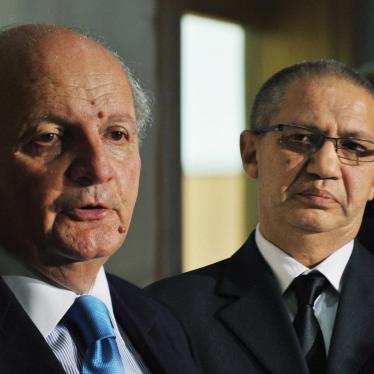An Uzbek human rights defender has been sentenced to seven years in prison in a politically motivated trial, Human Rights Watch said today. Yuldash Rashulov, a member of the Human Rights Society of Uzbekistan, was sentenced in Tashkent yesterday.
Rasulov, who had helped people persecuted for their religious beliefs and affiliations, was charged with attempting to overthrow the constitutional order (article 159 of the criminal code), distributing "extremist" literature (articles 244-1 and 244-2), and membership in a criminal organization. The evidence presented against him, however, only showed that he prayed five times a day and had listened to tapes on Islam commonly available in the mid-1990s. Furthermore, Rasulov claimed at trial that self-incriminating statements about his alleged involvement in "extremist" activities were made after he had been pressured.
"Rasulov should have been released today," said Elizabeth Andersen, executive director of Human Rights Watch's Europe and Central Asia Division. "The evidence didn't support the verdict in this clearly political case."
In a written statement to Human Rights Watch, Rasulov said that during the investigation he had been beaten and abused, and that he had signed self-incriminating statements before reading them because he feared sharing the fate of Shovrik Ruzimuradov, one of his colleagues from the Karshi branch of the Human Rights Society of Uzbekistan who died in custody in 2001.
The trial began on September 3 in Tashkent's Yunosobad District Court. The court upheld the state's claim that Rasulov had spread "Wahhabist" ideas, "secretly" watched video tapes, and listened to audio tapes that strongly criticized the government. While reading the verdict today, Judge Tolib Obidov referred to imams and militants who are on a government blacklist, stating that Rasulov cooperated with them all in a conspiracy to spread "Wahhabism." During the trial the prosecution presented no evidence of such cooperation, nor did it detail the criminal nature of the alleged cooperation.
In Central Asia "Wahhabism" is a pejorative term for Islamic religious observance that falls beyond strict state controls, and is meant to imply "Islamic fundamentalism." Those accused of "Wahhabism" generally have no links to the Wahhabi branch of Sunni Islam.
Two men who had been detained together with Rasulov initially signed statements asserting that he had taught them Islam, and were then released. Called to serve as prosecution witnesses, they retracted these statements in court. Rasulov acknowledged that in the mid-90s he had listened to publicly available cassettes with friends that were about the moral precepts of Islam. He also gave evidence that he observed the five daily prayers of Islam. Two witnesses confirmed his testimony.
Human Rights Watch objected that Rasulov's exercise of his rights was used as evidence of criminality. "Rasulov has the right to hold beliefs and to engage in protected speech, just like anyone else," said Andersen. "These are rights, not crimes."
After Rasulov's arrest on May 24, 2002, Uzbek law enforcement officials claimed that Rasulov had recruited young men for "terrorist training camps abroad" and for the Taliban. But the court dropped charges against him relating to "membership in a criminal organization," commonly used in such cases.
"The Uzbek authorities tried to convince the international community that Rasulov was involved in terrorism," said Andersen. "It's clear, though, that this was an attempt to discourage interventions on his behalf, to isolate him, and exploit fears of terrorism."
Government propaganda regarding the case, much like officials' statements accompanying past arrests of human rights defenders in Uzbekistan, seem aimed at discrediting legitimate human rights activity. "The government really showed its hand this time," said Andersen, of the attempts to smear Rasulov as a terrorist. "The Uzbek government has jailed Rasulov to stop him from documenting human rights violations, and to silence other defenders. They've made Uzbekistan a slightly more dangerous place, not safer."
After his arrest in Karshi, Yuldash Rasulov was held in incommunicado detention for approximately one month in the basement of the Ministry of Internal Affairs headquarters in Tashkent. Only the Organization for Security and Cooperation in Europe and the U.K. embassy sent monitors to his trial.








